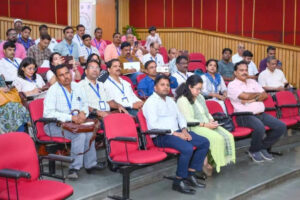
A Case for Pleasure Reading in Grad School (opinion)
A paper published last month in iScience about how we spend our time generated plenty of headlines in the popular media. How many people enjoyed reading them? Good question.
The work by authors at University College London and the University of Florida used data from the American Time Use Survey to look at how time spent reading for pleasure has changed in the United States over the past 20 years. The terrible news is that fewer and fewer people are reading, falling off at a rate of 3 percent per year, even as gaps in time spent reading for pleasure across different races, education levels and incomes have grown.
It seems likely that for many graduate students, the road to scholarship started with the joy of reading. How will less time spent reading for pleasure affect the formation of scholars?
Scholarly reading already has problems of its own. The literature keeps expanding, though at different rates in different fields. Artificial intelligence is already being used to generate or substantially generate papers that are being published, but it is hard to know how many. Meanwhile, information relevant to our work comes to us in more forms—podcasts, videos and increasing volumes of gray literature. How can a student avoid drowning in this flood of words, much less find time to read for pleasure?
A Marathon, Not a Sprint
When you are a student, you have a lot to do. Or do you? When you are overwhelmed, sometimes looking at the big picture helps. Whatever your field, graduate school is fundamentally about a few critical tasks: identifying and filling gaps in your earlier education that might keep you from taking up your chosen academic discipline, finding a problem or question to work on, defining your strategy for addressing the problem you have chosen, acquiring the knowledge you need to carry out that strategy, carrying out that strategy by doing your dissertation work, publishing what you have learned, and laying the intellectual groundwork for whatever comes next in your working life. That is a great deal of work, but it is sequential, and it builds on itself. Every step you do well makes the next step even better.
Whatever your career destination, you should think about what your life will look like five, 10 or 20 years in the future. What will you need to know? Where will your future self be on the spectrum from broad field knowledge to deep focus on an idea or phenomenon? If you are planning to continue doing scholarly work, your task will be to get both broad and deep. That’s going to take at least hundreds of hours of reading. If you are going to be in the world providing services rather than doing research, getting broad in your field and spilling over to pick up breadth in adjacent fields may be what you need.
What is the time scale of your work? If you are a scientist, you should know that the past history of your field is shrinking behind you: The window in which past published work is cited is growing shorter. The cutting-edge research you read today may be obsolete by the time you get your degree. This makes it more important than ever to understand, while you are reading, whether something you read is going to be yet another datum in the long march of your field or whether it is a turning point—the beginning of something new. It’s OK if you discover your judgment is a little off—there is a learning curve for telling the difference between what is fashionable and what is forever. The classics will endure, and you will have reason to read them again.
Groucho Marx Had It Right
Groucho Marx famously said, “Outside of a dog, a book is man’s best friend. Inside of a dog, it’s too dark to read.” From the time the printing press began making books affordable until very recently, having a book meant having a source of pleasure, a companion and an antidote to boredom. We haven’t outgrown the reasons we enjoy books. We have just filled our time with other things. Maybe that is a natural evolution: Our brains have found faster ways to intake stories. Podcasts do not make us carsick. AI can boil a complex topic down to five lines. Something’s lost in the condensing, but figuring out what would take some reading.
During the COVID-19 pandemic, book reading picked up, with the publishing industry reporting a sales increase of more than 8 percent in 2020 and another nearly 9 percent over that in 2021. Maybe those who read for pleasure rediscovered the opulent comfort of spending time curled up with someone else’s thoughts. Reading for pleasure is recreation, sure. But it is more than that: It drives creation. Savoring a book gives you time to take in another world. Better, it does it slowly: If you are so inclined, you can watch carefully and see how the magic trick—the plot—works. Whether you are purposefully paying attention to the mechanics or not, as long as you are reading and not skimming, reading good books also teaches you how to write. In almost every direction your career takes you, being a good writer helps.
Even better, reading implants knowledge—ideas, facts and figures, characters, history, ways of being—in your memory, providing more and different hooks for your mind to hang its own ideas on. The more things your idiosyncratic mind saves up, the more connections you can make and the more ways it can surprise you with thoughts you would have never guessed you could have. How you think about the world will change. Your ideas will be more your own and less built from the things you have learned in the classroom.
Source link



